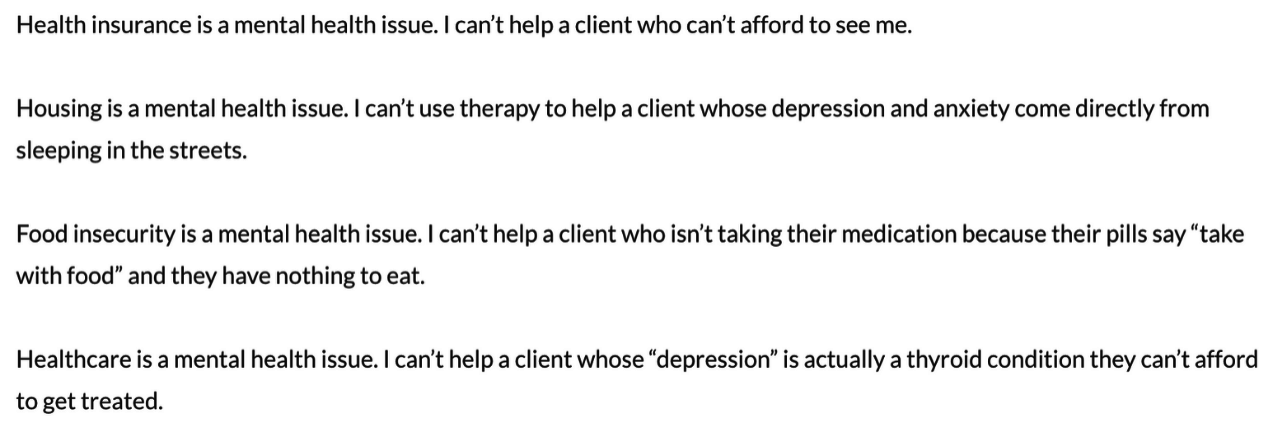Blog Post Shared on Facebook Highlights Why Therapy Can’t Be the Only Way We Address Mental Health
A main part of mental health awareness is letting people know it’s OK to reach out for help, and then we provide resources or encourage someone to seek out therapy. While this is important, mental health awareness is more than telling others to reach out. It’s also about acknowledging and finding solutions for what makes mental health care inaccessible to some in the first place.
Miss Mentelle, a clinical psychology graduate student and blogger on Tumblr, pointed out how we need to consider a variety of life situations as mental health issues as well because they prevent people from getting help. The blog post, which was written nine months ago, was shared on Facebook on Dec. 11 by Katherine Gonzalez and has since garnered over 60,000 shares.
For all of you asking, here's the original source link. I didn't think to put it because it's in the picture, and I didn…
Posted by Katherine Gonzalez on Tuesday, December 11, 2018
In her post, Miss Mentelle names multiple reasons why therapy is inaccessible and why mental health advocacy should go beyond just encouraging therapy. If someone doesn’t have health insurance, for example, they probably can’t afford therapy in the first place. According to recent survey data, 53 million Americans wanted to see a mental health professional but were unable to for reasons they couldn’t control. The most significant barrier was cost.
On top of financial strains, Miss Mentelle highlights other barriers to mental health. She notes that therapy can’t help if someone’s “depression and anxiety comes directly from sleeping in the streets.” It’s a lack of safety and housing security that leads to a mental health issue or worse symptoms, not the other way around.
If someone can’t take their medications because they need to be taken with food, but they can’t afford food regularly, therapy can’t remedy that. She also can’t help someone who is too tired to come to therapy because they work long hours to pay for childcare.
Even if someone can afford therapy and has the time to go, therapy can’t fix issues like the justified anxiety of someone who could be the victim of police brutality, Miss Mentelle wrote. She can’t help people who self-medicate with drugs if they end up in prison when what they really need is mental health care.
We can’t fix mental health if we’re not also addressing the barriers preventing people from getting help at all.Miss Mentelle highlights that advocacy needs to go beyond just telling people to go to therapy. She added:
If you’re going to make a stand for improving mental health, you have to understand that addressing mental health goes way beyond hiring more therapists and talking about mental health on social media. If we’re really serious about tackling this mental health problem as a country, it means rolling up our sleeves and taking down the barriers that prevent people from getting the help they need — even if those people are different than us, lead different lives and make choices we don’t agree with.
While there are issues therapy cannot resolve, it’s still an important component of mental health. Miss Mentelle’s post, however, is a reminder we also need to keep the big picture in mind.
“We aren’t ‘fixing’ mental health unless we’re fixing it for everybody,” she concluded.
Photo via Getty Images/Benjavisa

